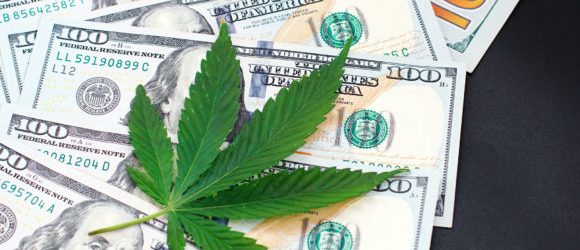 https://cannabisexaminers.com/wp-content/uploads/2020/03/how-surety-bonds-are-covering-californias-cannabis-580x386.jpg
https://cannabisexaminers.com/wp-content/uploads/2020/03/how-surety-bonds-are-covering-californias-cannabis-580x386.jpg
It’s not just toilet paper and hand sanitizer people have been stocking up on during the COVID-19 crisis.
Inventory levels at adult use cannabis stores in the U.S. showed a quick decline after the COVID-19 crisis began, as what was once an illicit drug seems to have not only become mainstream, it is now being declared an “essential business” but a number of state governments.
In California, for example, the pre-COVID crisis average inventory carry levels were roughly 4.7 weeks (meaning the average retailer had about 4.7 weeks of inventory on hand), according to Seattle, Wash-based research firm Headset.
By last week, this had decreased to only about 3.3 weeks supply, according to the research firm.
In Canada inventory levels also rapidly declined, with average inventory coverage at about 5.8 weeks pre-crisis and 3.1 last week, according to the research firm.
This week, however, the “stock-up behaviors” cooled off in places like California and Nevada, where Headset reported “dramatic sales declines.”
Research from the Brightfield Group, a CBD and cannabis-focused market research firm, shows 31% of cannabis consumers plan to use cannabis more frequently as a result of the COVID-19 crisis. The data is from a survey of 941 cannabis users in the U.S. from March 16 to 19.
Despite California being under lockdown, cannabis dispensaries can continue to offer delivery and pick-up service. California Gov. Gavin Newsom deemed cannabis an “essential medicine” and stated it serves as a pharmacy to many people.
Similar actions were taken in several other states, while regulations in a number of states were changed to enable delivery of cannabis products.
Even before the virus struck, poll after poll has showed that a majority of Americans support federal legalization of marijuana.
The upshot of the virus’ impact on the cannabis industry, and those who work to insure cannabis businesses, may be the broad recognition that cannabis is a legitimate as well as essential business, and importantly, it may be worth the risk of insuring.
“Now we have state governments going so far as to include medical cannabis as essential,” said Michael Sampson, a partner in the insurance recovery group and co-vice chair of the cannabis law team for in the Pittsburgh, Penn., office of ReedSmith. “It’s a whole other thing in a time of crisis to see state after state declaring medical cannabis as essential.”
The recognition of cannabis operations as “essential” could change the insurance landscape for the industry, according to Rocco Petrilli, chairman of the National Cannabis Risk Management Association.
“That brought a lot of prominence to the fact, particularly on the medical side, that this is not simply a recreational drug or a placebo, that people are very much reliant on it,” Petrilli said.
One of the goals of the NCRMA has been to open up additional capacity in the insurance industry, which Petrilli said has largely still shunned the cannabis.
“The capacity is very limited, so we’re in a supply and demand situation and demand has overwhelmed supply,” said Petrilli, who believes this is the one silver lining in the COVID crisis.
Chris Boden, cannabis and life sciences practice group team leader with wholesaler Crouse & Associates, who has been arguing for years that insurers should consider cannabis a legitimate opportunity, has seen progressively more carriers step into the space.
Boden believes this crisis and the treatment of cannabis dispensaries by state governments as an essential business may be the push that’s needed to get more insurers off the fence and into the cannabis insurance game.
“A lot more carriers are starting to see this as a legitimate and viable business opportunity,” Boden said. “This definitely will shine more of a positive light on it.”
Not all lights being shined on the cannabis industry during the crisis are positive.
A persistent problem with the industry has been that the drug is all-too-often marketed as a panacea. It’s been touted as everything from a sexual enhancer to a cure for cancer.
The National Organization for the Reform of Marijuana Laws on Monday sent out a press release hoping to make people aware of online misinformation surrounding the use of either whole-plant cannabis or CBD as a potential remedy for the COVID-19 virus.
NORML in its announcement noted that “some predatory marketers are seeking to profit by selling a host of products under a variety of false or unsubstantiated claims,” some of whom are explicitly targeting cannabis consumers.
NORML used as an examples:
- One recent CBD provider recently received warning letters from the U.S. Food and Drug Administration and the Federal Trade Commission for improperly marketing the agent as a key component of its COVID-19 prevention package.
- In Oregon, the Attorney General ordered a Portland CBD retailers to remove misleading advertising claiming that the compound may boost one’s natural immunity to the virus.
- In Vancouver, Canada, an unlicensed CBD distributor has come under fire for opining that their products can “help your body defend against COVID-19.”
“If something sounds too good to be true, it likely is,” NORML Executive Director Erik Altieri said in a statement. “During these difficult times, we encourage people to be skeptical of any unsubstantiated claims, particularly those circulating online, surrounding the use of cannabis or any other uncorroborated treatment for COVID-19.”
Petrilli sees another upside to the COVID crisis for the cannabis industry. He said NCRMA staff has lately been field more calls from members with questions about implementing more risk management practices.
“That’s what we’re hearing from our members. They have now have needs. They now have significant needs,” Petrilli said. “This event is making them realize those needs. I think what it does for cannabis, if not all American businesses, is it highlights the need for risk preparedness.”
Related:

